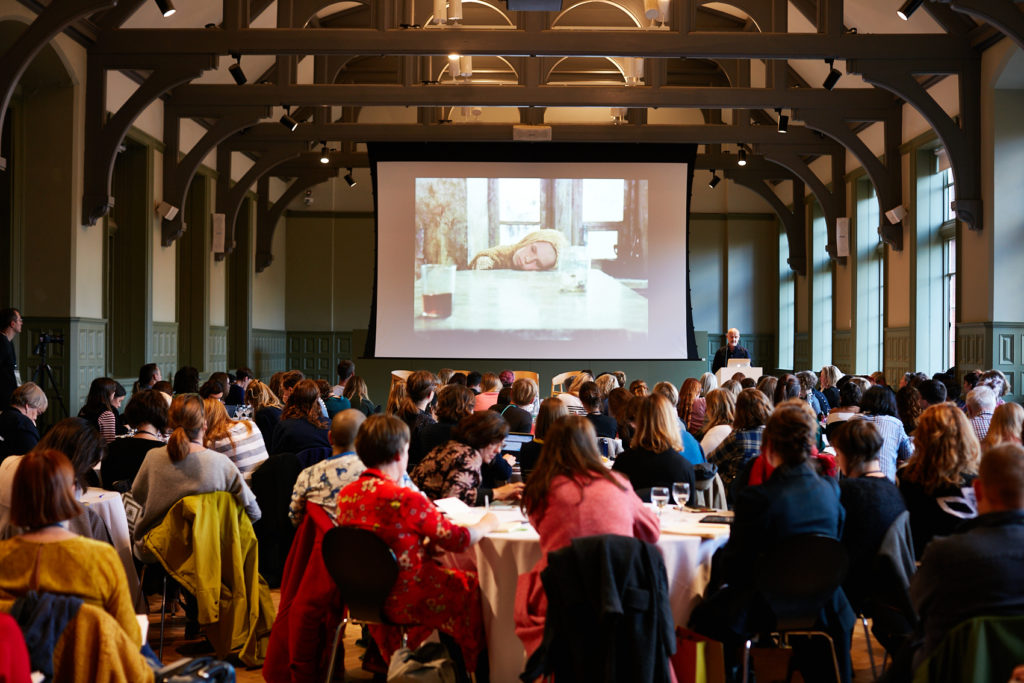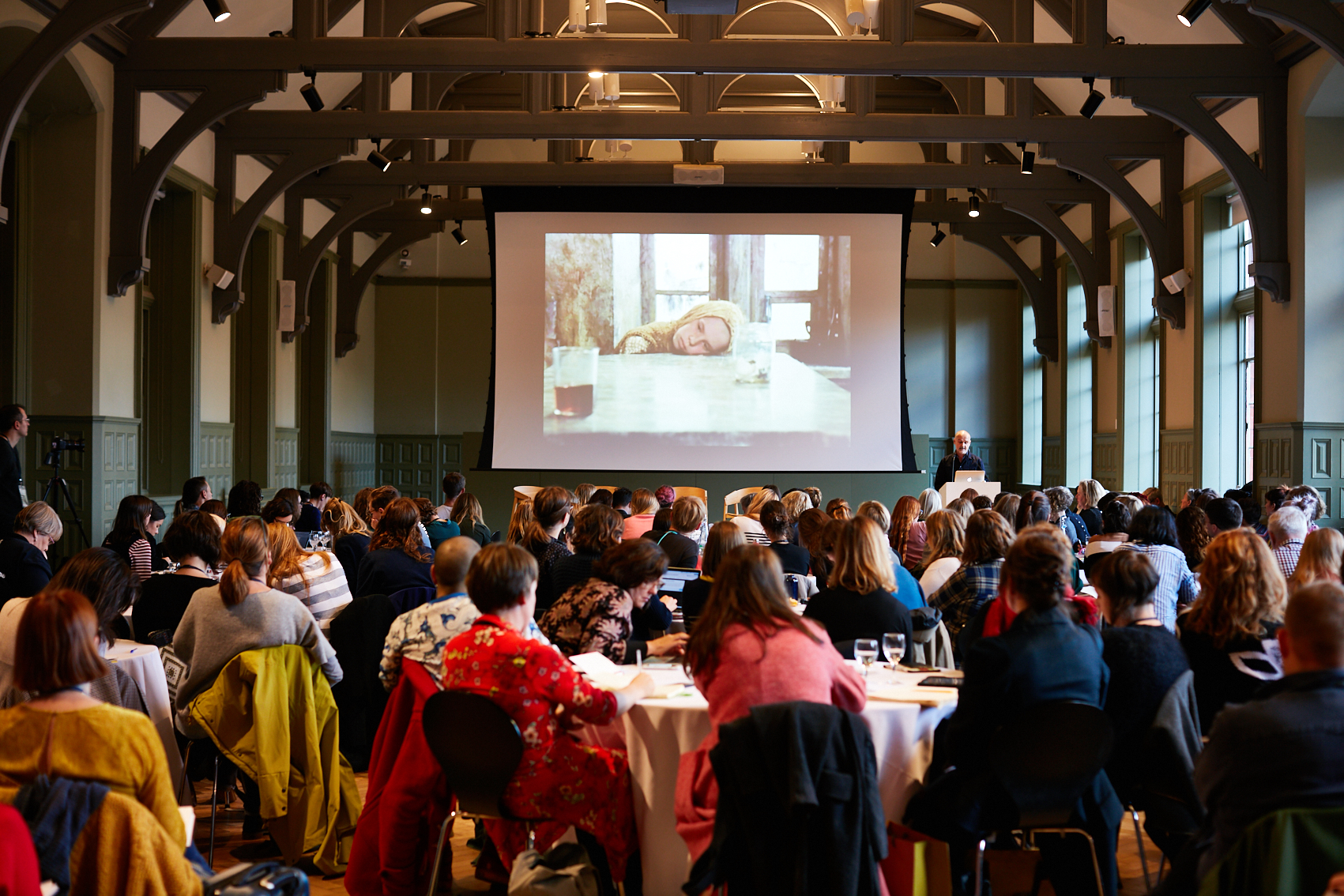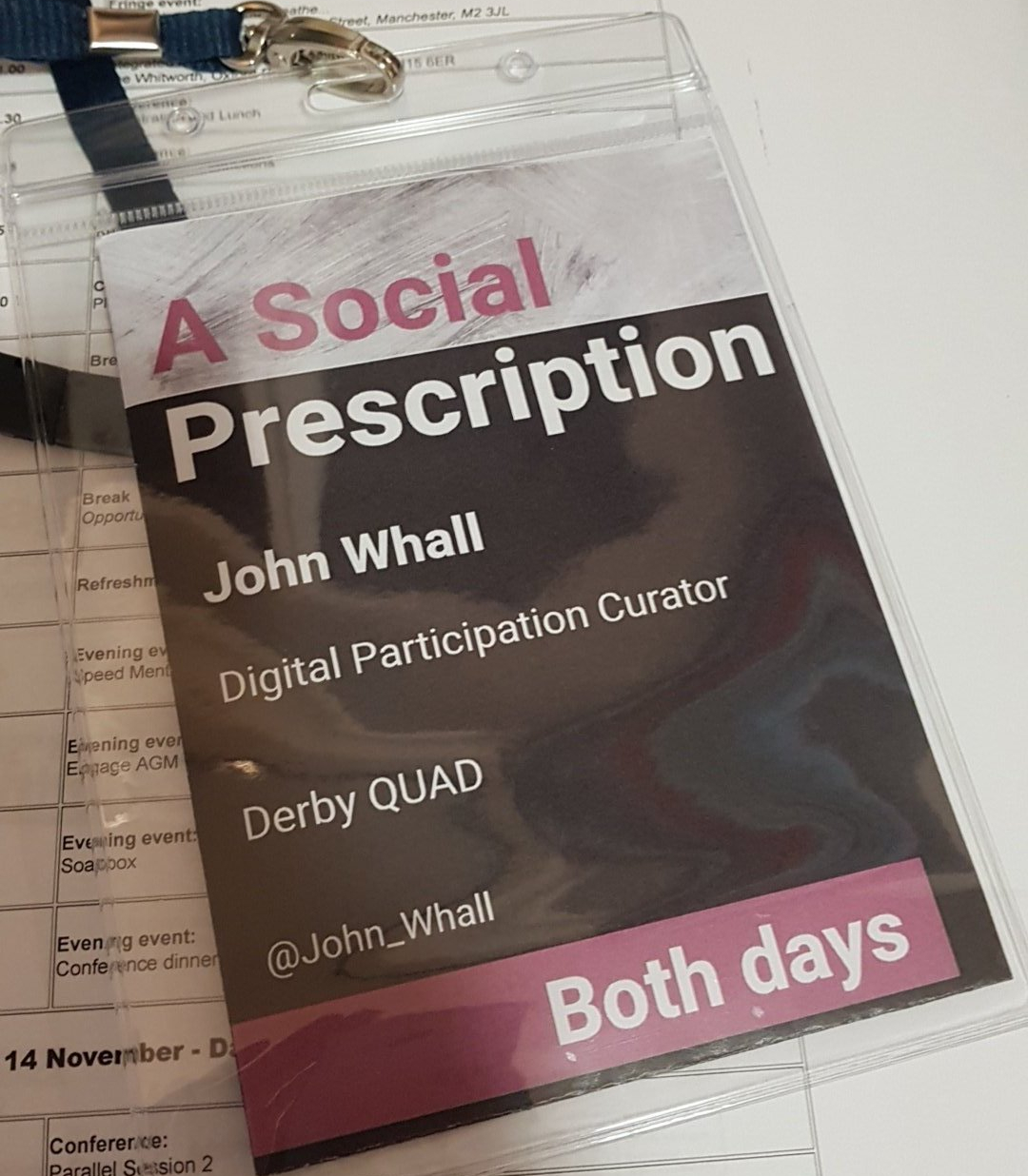
The Engage Conference 2018 – A Social Prescription
Whitworth Art Gallery, Manchester, 12-14 Nov 2018
Highlights and thoughts

How to encapsulate three days of keynotes, practical workshops, presentations, fringe events, discussions, thoughts and an absolute sense of wellbeing for participants and those working in the arts? The Engage Conference is the biggest coming together of artists, practitioners, facilitators, leaders and those working in gallery education and learning in the UK. To break down all the amazing things that happened over the course of the event would be a long read, so if you do want to discover more then head over to the Engage website.

From start to finish this was a fantastic event to not only attend, but to be invited to speak at and introduce great work and people in arts and wellbeing throughout the UK. Clive Parkinson’s (Director, The Manchester Institute for Arts, Health & Social Change, Reader in Arts, Health & Social Justice) eloquent and artistic opening keynote to Rachel Blanche’s (Lecturer in Cultural Policy and Management, Queen Margaret University Edinburgh) quality features in participatory arts practice set the framework for absolute importance of why arts as a social prescription is essential for our mental and physical wellbeing.
As QUAD’s Digital Participation Curator, I also lead the Creative Wellbeing team and it was an honour to be invited to chair the first plenary of the conference on Community Engagement: Tactile to Virtual. My peers on stage were an absolute pleasure to be among and discover more about the key work they are involved in. Karen Ingham Professor of Art, Science and Technology Interactions presented on using VR illustration tool Tilt Brush in exploring the mental health of young people at University and the potential outlet it can provide for young people to describe their experiences through VR drawing. Rachel Massey, Art and Wellbeing Engagement Programmer at Yorkshire Sculpture Park spoke about the powerful Leap of Faith project engaging vulnerable local women through the work of artist Katrina Palmer. The final speaker Clare Reynolds, was joined by participant Jamie Neville, who spoke about the participatory performance project Man Up, which used performance to reflect on men’s mental health in Stoke-on-Trent with Restoke. What was exceptional in this final presentation was that it included the voice of the participant. Jamie said more about the impact of his involvement in the Man Up project then you can normally capture in any funding or post-project evaluation report. It was during the final questions from the audience that summed things up perfectly when Jamie said, “I’m not the same person I was before the project; I’ve grown, I am empowered”. This is the impact the arts can have on a person and on a wider society.
Another aspect of the conference programme that took be back was the practical Parallel Session with Clod Ensemble on Performing Medicine. Now the practical element to this session was a simple reminder of the small physical things we can do to wind down at the end of a long busy day, or in my case the Sheffield to Manchester train. What informed these exercises was the learning and development of Clod Ensemble’s Circle of Care project, a framework to help healthcare professionals think about, practise and demonstrate high quality compassionate healthcare. This project, as well as the conference as a whole, brought back the notion that we, the front line of arts and health engagement, need to look after ourselves along with our fellow colleagues, at the same time as carefully considering and delivering arts experiences for some of the most vulnerable in society.
A fascinating part of the conference was the Soap Box evening event which gave platform to arts workers to, in 4 minutes or less, present on a project, concept or method of working around the conference theme. This was fast paced and eye opening. Eleven presentations in less than an hour. Ready, steady… Presentations included the opportunities to increase diversity in arts careers for young people, a nursery in residence, arts delivery in hospital Renal Units, how we individually see work differently, and in my case, speaking on Capacity Assessments: a process when working with inpatient services for residents with acute mental health needs, which informed part of Leila Johnston’s digital participation residency here at QUAD.
I also had the honour of speaking on the Ethics Committee, a part of the conference programme where panellists were asked questions submitted online prior to the event, led by Angela Samata, Freelance Arts and Mental Health Professional who lost her husband to suicide. There was a realness about this part of the programme. Partly because the conversations were steered by the selected questions, but also because it was a speaking platform for the rest of the delegates in the room as well. Submitted questions included the “fun” part of families coming to galleries, convincing teaching staff to engage young people in challenging works of art and how we engage with audiences who communicate through BSL. What I found most valuable were the questions and thoughts from the room. Especially so when they involved our own mental wellbeing, the impact projects have on us, what happens when they’re over and how a handful of people can perpetuate a positive ongoing experience in the arts for so many individuals. All of which came from our own personal experiences. Other panellists: Katy Culbard, Programme Manager at Loudspeaker, Nottingham Contemporary; Claire Ford, Artist; Cathy Cross, Schools & Colleges Artist in Residence, Heart of Glass, along with delegates, like Jamie, became participants speaking their own stories.
It was clear that personal care and peer support became strong themes and discussion points in what was a conference about the social prescription that is arts and culture. Like other industries, the arts can include long hours, deadlines, cuts to funds, stress and all while taking care of the wellbeing of others. Sometimes it’s easy to forget our own. Because of this, I was taken back by the final keynote by Esme Ward, Director, Manchester Museum. In it she spoke on Culture, Care and Imagination, but importantly the ‘Boost’ programme, a parallel programme of wellbeing and care for staff, volunteers and artists to run alongside capital development projects. With any capital development project or programme you tend to focus on things rather than people. A new building, a technologically advanced theatre or gallery, a supportive sensory space, or just a simple procurement of equipment. While the goal is to provide for the needs of the audience, the city or the portfolio of the countries cultural offer, the ongoing people part of these projects can sometimes be missed. I most certainly hope the ‘Boost’ programme, like the inclusion of the ability to apply for mental health support in an Arts Council Grants for the Arts project application, becomes a staple part of any major project that involves people putting time, energy, skills and passion into the infrastructure of the fantastic arts and culture offer we have in the UK.
This was a people’s conference, with people’s voices. It involved conversations, putting faces to names and great hospitality among the beautiful Whitworth gallery spaces and park. It was discussing concepts, ideas and making plans to develop things further. It included a conference size group of people taking over a Lebanese restaurant and enjoying some fantastic food. When people come together, people shine and when people shine, they care more about others.
I most certainly look forward to the Engage Conference 2019.